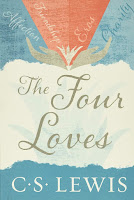The four
loves are 1) Storgé/familial love, 2) Friendship, 3) Eros/romantic
love, and 4) Agape/Charity. His description of storgé was so endearing that I
had to stop listening and write it down. It comes from Greek and refers to
affection, especially of parents to children.
It’s
usually the humblest of the loves. It gives itself no airs. Storge is modest,
even furtive and shame-faced. Storge has a very homely face. So have many of
those for whom we feel it. It’s no proof of your cleverness or perceptiveness
or refinement that you love them nor that they love you. To have to produce
storge in public is like getting your household furniture out for a move. It
was all right in its native place, but it looks tawdry out of doors. And the
feeling of storge is so nearly organic, so gradual, so unemphatic, that you can
no more pride yourself on it than on getting sleepy towards bedtime. It lives
with humble, unpraised private things: the thump of a drowsy dog’s tail on the
kitchen floor, the sound of a sewing machine, easy laughter and easy tears on
some shrewd and wrinkled old face, a toy left on the lawn. It’s the most
comfortable and least ecstatic of loves. It is to our emotions what soft
slippers and an easy, almost worn-out chair, and old clothes are to our bodies.
It wraps you round like a blanket almost like sleep. At its best, it gives you
the pleasure, ease, and relaxation of solitude without solitude itself.
Beautiful,
right? But just when I was completely enamored, he delineates all the ways this
kind of love can be distorted. That is
how the book goes. He explains each type of love at its glorious best and then
shows how easily it can turn into something manipulative and selfish. His conclusion
comes in the final chapter where he emphasizes the importance of self-giving love as
the only solution for keeping the other loves from becoming corrupted. In this chapter he
writes his famous lines:
To love at
all is to be vulnerable. Love anything, and your heart will certainly be wrung
and possibly be broken. If you want to make sure of keeping it intact, you must
give your heart to no one, not even to an animal. Wrap it carefully round with
hobbies and little luxuries; avoid all entanglements; lock it up safe in the
casket or coffin of your selfishness. But in that casket – safe, dark,
motionless, airless – it will change. It will not be broken; it will become unbreakable,
impenetrable, irredeemable…. The only place outside Heaven where you can be
perfectly safe from the dangers and perturbations of love is Hell. (p. 121)
Note: The
book gets a bad rap for some comments he makes about the differences between
men and women, but, honestly, don’t let that keep you from reading it. Anything
written by Lewis is worth tackling for his wonderful clarity and depth.



1 comment:
Thank you so much for giving us these wonderful quotes. I had read the second but not the first, and you are right, it is very heartwarming and true, what he says so eloquently. Thanks to God!
Post a Comment